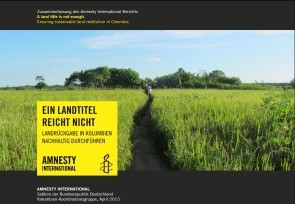Amnesty International
The civilian population, especially rural and poor urban communities, continued to bear the brunt of the long-running armed conflict.
Guerrilla groups, paramilitaries and the security forces were responsible for serious and widespread human rights abuses and violations of international humanitarian law, including war crimes. President Juan Manuel Santos, who assumed office in August, said he would prioritize human rights and the fight against impunity. In marked contrast to the previous government, he adopted a less hostile stand towards human rights defenders. The new government presented legislation on reparation for victims and land restitution, which it claimed would benefit those affected by human rights abuses. However, victims’ and human rights organizations expressed reservations about the legislation and human rights defenders and social leaders continued to be threatened and killed. Those campaigning for the return of lands misappropriated during the conflict, mainly by paramilitary groups, were at particular risk. Human rights defenders, judges, lawyers, prosecutors, witnesses, and victims and their families involved in human rights-related criminal cases were also threatened and killed.


